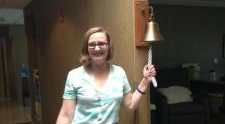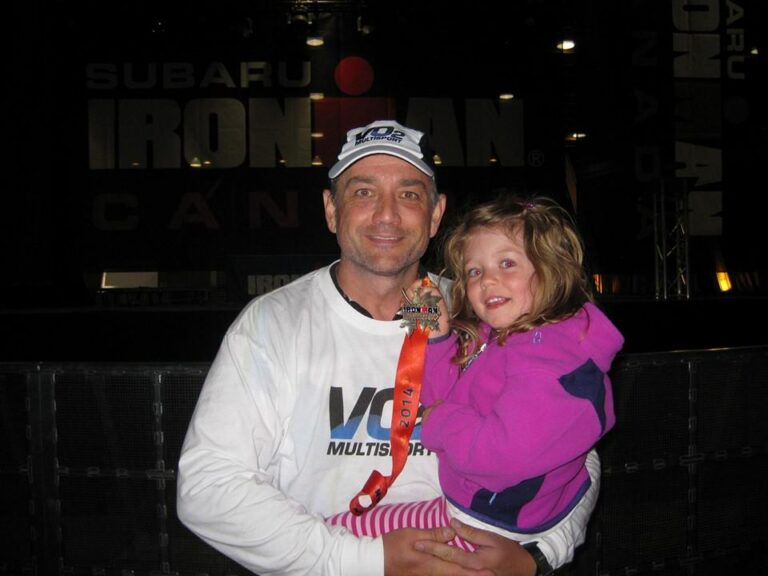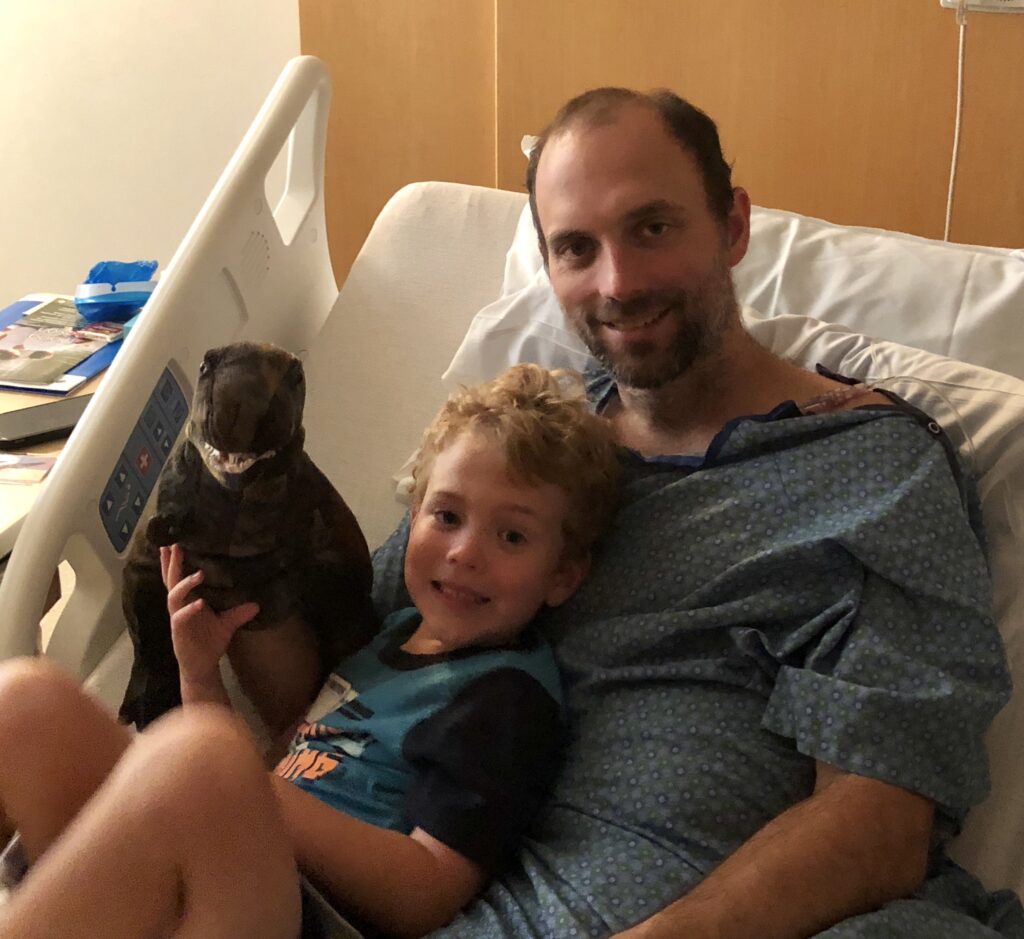
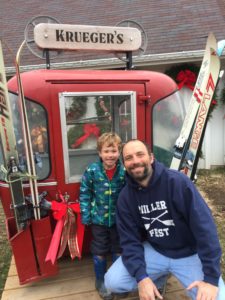 November 3, 2016 started like any usual day for Justin Vossen. It wasn’t until he got to work that he felt a little off. He thought it could be the flu that his wife and son had just gotten over. “I thought maybe I just need to eat something, so I went and got an early lunch and started to feel worse and worse and I had to go home for the day.”
November 3, 2016 started like any usual day for Justin Vossen. It wasn’t until he got to work that he felt a little off. He thought it could be the flu that his wife and son had just gotten over. “I thought maybe I just need to eat something, so I went and got an early lunch and started to feel worse and worse and I had to go home for the day.”
After getting home, Justin decided to rule out any other issues by taking a shower and resting, but soon started experiencing a dull pain in his abdomen. He decided to lay down and see if the pain would subside, but it intensified and became unbearable. It got to the point where he knew something was wrong. He tried to sleep through it when his wife came home, but around 9 pm he finally told his wife they had to go to the ER. “I told her I believed it was my appendix because it was on the right side of my abdomen that was hurting.”
Once there, they discovered that his appendix ruptured, and emergency surgery was needed. It was during the surgery when they found a mass in his colon. The mass and a section of his colon were removed and his colon re-sectioned. Justin was unaware of the mass. The doctors told him after he woke up from surgery. “When they went in to remove the mass, they saw five spots on my liver as well. At that point, I was diagnosed at stage IV colon cancer. They removed 43 lymph nodes and 14 of them were cancerous. So out of nowhere. No prior issues, no blood in the stool, no irregular stool, no constipation, nothing.”
While in surgery, his wife mentioned to the physicians that Justin’s father,who had passed away, was diagnosed with colon cancer. “My dad’s combination of both colon cancer and emphysema ultimately led to his passing. There is family history there, but the only thing my mom was informed of was that because there was evidence of a direct family member having colon cancer, screening would be moved up from the recommended age of 50 to 40 years of age.” Justin was 36 when diagnosed.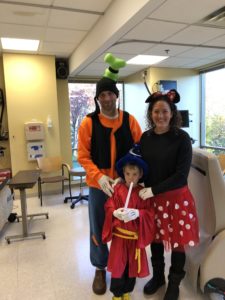
A year prior to his diagnosis, Justin had gone for a physical and asked if he could get a colonoscopy as well. The doctor had told him he was too young and that it wasn’t necessary. “If I would’ve pushed for the colonoscopy at the time, maybe things would be different.”
Justin stayed in the hospital for 10 days to recover. “After those 10 days, I had time to recover at home. A month after, I was going in for my first round of chemo.” His experience with chemo only lasted eight rounds. He experienced extreme nausea and the anti-nausea medicine didn’t help. His first day of chemo landed him in the ER getting replenished with fluids. During his chemotherapy, Justin had two PET scans that showed no significance change. “It was neither a good nor bad reaction. There wasn’t any remission or growth. Because I was having such a negative reaction to the chemo, that’s when they offered me two options. I could change the chemo drugs I was receiving or switch to an immunotherapy drug.”
He decided to switch to the immunotherapy drug. “It was a better option because I was getting sick every time, and I couldn’t work. I felt awful. I haven’t turned back since. All the nausea, the neuropathy, all the significant side effects on the eight rounds of chemo, were not present with the immunotherapy.” On April 3, 2017, the treatment started but after three months, which concluded in the end of June, he went in for a scan and still there was no significant change. “Again, no growth, but no remission. Also, at that time I decided to be more active in researching other options to fight, such as high-dose vitamin c infusions, holistic approaches, and started being healthier, cutting out red meat and sugar.”
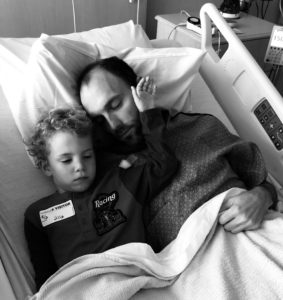 There was no remission or spreading of the cancer, but one of the spots on his liver had doubled in size. Justin was given the choice to add another immunotherapy drug. During the treatment for the combination of drugs, he started having a feeling on his right side where the liver was. The pain gradually increased to discomfort. He called in about the discomfort but decided to wait a couple of days until his scheduled appointment with his oncologist to discuss the pain. A PET scan on July 31, 2017 had shown that the spots on his liver had shrunk to two, and had shrunk significantly in size.
There was no remission or spreading of the cancer, but one of the spots on his liver had doubled in size. Justin was given the choice to add another immunotherapy drug. During the treatment for the combination of drugs, he started having a feeling on his right side where the liver was. The pain gradually increased to discomfort. He called in about the discomfort but decided to wait a couple of days until his scheduled appointment with his oncologist to discuss the pain. A PET scan on July 31, 2017 had shown that the spots on his liver had shrunk to two, and had shrunk significantly in size.
Diligently keeping up with his therapies, a scan in early October had shown only one spot left on his liver, but no difference in size. In November, Justin went in for a consult at Abbott Northwestern about a liver resection. The doctor who consulted on the pre-op for the liver resection was the same one who had done his physical the year prior. “He came in, recognized me right away and apologized. I told him that he didn’t know, but then asked him to do me a favor. If anyone asks for a colonoscopy, just say yes. Don’t say anything about age.”
On December 6, the surgery was a success removing four of the five spots where the lesions were. The last spot that was a shadow region was on a primary blood vessel. “The spots removed were not cancerous, just labeled as infection.” The pathology report in late December showed no evidence of disease. It was suggested that he be put on a 2-year period of preventative maintenance, which started in January of 2018. The first PET scan after the surgery in April of 2018 showed no evidence of disease. Justin is going on 26 months of NED since a recent scan in 2020.
“The way I look at it was to always stay positive. I definitely had my ups and downs; it’s expected with a disease like this. But I truly believe that positivity has contributed to the positive results in 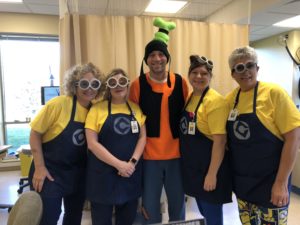 my journey.” Although holistic choices are not popular treatments and are not for everyone, Justin found them to help in healing his body. “Why wouldn’t you try everything possible? You’re not too young. Stay positive and take ownership of our life. Send the message to your body that ‘We’re taking this down.'”
my journey.” Although holistic choices are not popular treatments and are not for everyone, Justin found them to help in healing his body. “Why wouldn’t you try everything possible? You’re not too young. Stay positive and take ownership of our life. Send the message to your body that ‘We’re taking this down.'”
RETURN TO FACES OF BLUE LEARN MORE ABOUT YOUNG ONSET COLORECTAL CANCER LEARN MORE ABOUT GENETICS AND COLORECTAL CANCER GET YOUR REAR IN GEAR - TWIN CITIES

